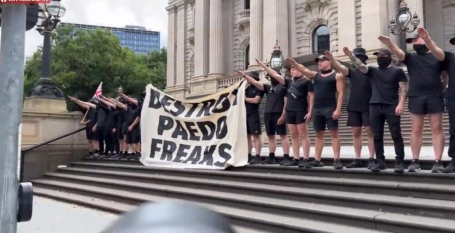Over the weekend, a transphobic demonstration in Melbourne was led by fascist groups wearing black and making Nazi salutes.
The government has subsequently said that they will move quickly to ban the gesture as it is being used to incite hatred against minorities.
The transphobic demonstration was fronted by Kellie-Jay Keen - a prominent transphobic figurehead from the UK. She was supported by about 30 men from the Nationalist Socialist Network who marched along Spring Street in the centre of Melbourne, repeatedly performing Nazi salutes.
The move to ban the Nazi salue gesture in Victoria appears to have bipartisan support. However there are calls for a wider discussion about what is creating the environment that is emboldening transphobia and fascism in Australia.
What’s life like for LGBTQ people who live in Australia?
What’s life like for LGBTQ people who live in Australia? Let's take a look at some of the key equality indicators.
Is it legal to be gay?
Yes. The United Kingdom invaded the continent we now know as Australia in 1788. The colonies that they established inherited their laws from the UK – including the Buggery Act of 1533 that made sodomy a crime punishable by death.
Over time, the colonies developed into states, and a federation was created so that they could operate as one country.
Sodomy remained a crime punishable by death until 1949 (some states removed it earlier than others).
Being gay remained a crime in Australia until 1997 (although some states began the repeal process in 1975).
It is now legal to be gay in Australia.
Is there anti-discrimination legislation in place?
Yes. Comprehensive anti-discrimination legislation was implemented across all states in Australia in 2013. Prior to that, the anti-discrimination protections had been evolving (from around 1986) but had been fragmented.
Is there marriage equality?
Yes. Following a public vote in 2017, Australia has embraced marriage equality.
What’s life like for LGBTQ people who live in Australia?
While there are still isolated incidents of homophobia and anti-gay violence, Australia is a good place to be gay.
You will find gay people living openly in communities across the country (not just the larger cities), and media representation of LGBTQ characters is generally positive. There are numerous Pride celebrations held across the country.
However, LGBTQ people from Indigenous communities have poorer health outcomes and face additional barriers to living openly.

